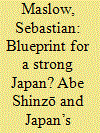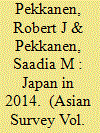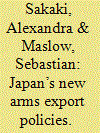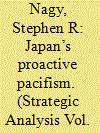| Srl | Item |
| 1 |
ID:
141493


|
|
|
|
|
| Summary/Abstract |
Abe Shinzō has pledged to “take Japan back” from its constraining postwar regime. Redesigned institutions for intelligence and security policy coordination and “proactive pacifism” have facilitated the exercise of collective self-defense and strengthened the US–Japan alliance. The evolving security system is accelerating the dilution of Japan’s pacifist norms.
|
|
|
|
|
|
|
|
|
|
|
|
|
|
|
|
| 2 |
ID:
137905


|
|
|
|
|
| Summary/Abstract |
It was all about Abe in 2014. With few intra-party challengers, a divided and weak opposition, and a huge victory in a December snap election gamble, Japan’s Prime Minister Abe finds unusual scope to lead the nation both domestically as well as internationally in his chosen course of ‘‘proactive pacifism.’’
|
|
|
|
|
|
|
|
|
|
|
|
|
|
|
|
| 3 |
ID:
175660


|
|
|
|
|
| Summary/Abstract |
This article examines the significance of the changes in Japan’s arms export policy following Prime Minister Abe Shinzō’s return to power in 2012—a topic which has so far received insufficient scholarly attention. Established in the 1960s and 1970s, Japan’s ‘virtual’ ban on arms exports was an expression of the country’s postwar anti-militarism. Yet, in keeping with Japan’s increasingly active role in security affairs, Abe lifted the ban on weapons exports in 2014. Within the Ministry of Defense, a new agency was installed to oversee the arms industry and to promote military-related research and weapons transfers. We show that the Abe administration conceives of arms exports and related cooperation as an integral part of its national security strategy. Tokyo not only hopes to improve the competitiveness of its own defence industry, but also seeks to cement existing and new security partnerships while contributing to regional capacity building as a hedge against a rising China. The actual ramifications of this policy change are far from clear yet, however. A major constraint for policymaking is the reluctance of the defence sector to embrace arms export due to the associated business risks including the fear of tarnishing their corporate image.
|
|
|
|
|
|
|
|
|
|
|
|
|
|
|
|
| 4 |
ID:
152652


|
|
|
|
|
| Summary/Abstract |
Since 2012, Japan’s foreign policy under Prime Minister (PM) Abe has been characterized as assertive, welcome or provocative. By employing the fear of abandonment/entrapment theory as the analytical framework, this article finds that Japan’s regional foreign policy under Abe is characterized by consolidation and investment in broad-based multilateralism, proactive engagement with partners in the region, including China, and strategic hedging. Findings suggest that the current foreign policy under the rubric of ‘proactive pacifism’ will continue to expand as Japan endeavours to consolidate and invest in multilateralism and rule-based norms through regional trade agreements, and by playing a proactive role in international organizations and regional security operations that abide by Japan’s constitutional limitations.
|
|
|
|
|
|
|
|
|
|
|
|
|
|
|
|